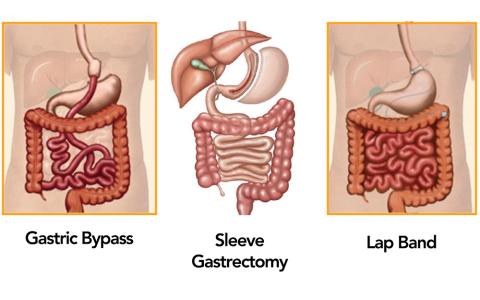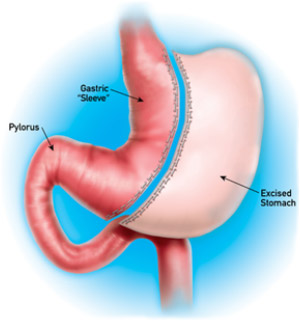
Revision Bariatric Surgery
Revision bariatric surgery in New Jersey – sometimes known as revisional surgery - refers to a weight loss procedure after a patient has regained weight after prior weight loss surgery.
Patient Journey
From beginning to end, the journey for a patient undergoing bariatric care is full of changes. It will require persistence and discipline, but in the end it is all worth it. Feel free to learn more about the patient journey.
Although bariatric surgery is usually quite effective, at times, it does not work as well as one would like. In such instances, a revisional bariatric surgery procedure may be considered. It is important to remember that revision operations are more technically challenging and carry a higher complication risk. Patients need to seek out very experienced bariatric surgeons that perform revisional bariatric surgery procedures routinely. Not everyone who regains weight or fails to lose as much weight as they would have liked are candidates for revisional bariatric surgery.
One must stress that morbid obesity is a multi-factorial disease, hence a multi-disciplined approach should be utilized to treat patients that have regained or failed to lose weight. Successful bariatric surgery starts with the operation. Some operations have been done much longer and have been proven to be more durable over time. Postoperative instruction and support are also very important. Snacking behavior, poor water intake, lack of exercise, and poor supplementation intake can all lead to poor outcomes. When patients are being evaluated for a revision in our program, a consultation with the surgeon is scheduled.

 Sleeve revision surgery should be considered when the initial sleeve has failed to achieve the desired results. Sometimes a patient who undergoes a gastric sleeve does not experience sufficient weight loss. This could be due to the sleeve being made too large by the initial surgeon (which oftentimes happens early in a surgeon's experience conducting this operation), the sleeve stretching out over time, or the result of poor reduction of calorie consumption. Revision surgery is an excellent option for the first two types of problems whereas the third type of patient would benefit most from proper instruction and can therefore avoid revisional bariatric surgery. The revisional options for sleeve gastrectomy include Re-Sleeving, placing a gastric band over the sleeve, or converting to a Roux En Y Gastric Bypass.
Sleeve revision surgery should be considered when the initial sleeve has failed to achieve the desired results. Sometimes a patient who undergoes a gastric sleeve does not experience sufficient weight loss. This could be due to the sleeve being made too large by the initial surgeon (which oftentimes happens early in a surgeon's experience conducting this operation), the sleeve stretching out over time, or the result of poor reduction of calorie consumption. Revision surgery is an excellent option for the first two types of problems whereas the third type of patient would benefit most from proper instruction and can therefore avoid revisional bariatric surgery. The revisional options for sleeve gastrectomy include Re-Sleeving, placing a gastric band over the sleeve, or converting to a Roux En Y Gastric Bypass.
- Re-Sleeving is an excellent option for those patients who have a sleeve that appears too large. After conducting an endoscopy, your surgeon will know first hand if the sleeve appears to have stretched or perhaps was made too large initially. Re-sleeving will involve re-sizing the stomach pouch again in a matter similar to the initial sleeve operation. Most of the time this procedure can be conducted laparoscopically and usually involves just an overnight stay in the hospital and return to light-duty work in approximately 7-10 days. The risks of this surgery (including leaks, bleeding, gastric outlet obstruction) are slightly higher than the initial surgery but are still quite safe.
- Band oversleeve is an excellent option for those patients that appear to have a larger upper portion of the stomach (fundus), but have a narrow middle and lower portion of the stomach. Because of the narrow lower parts of the stomach, an attempt at re-sleeving could cause a blockage to the exiting part of the stomach and that would result in having to convert the patient to a roux en y gastric bypass to “bypass” the blockage.
- Converting to a Roux en Y gastric bypass is an option for patients who have inadequate weight loss, or who have severe reflux after sleeve gastrectomy.
- The Insurance experts at the New York Bariatric Group will verify your insurance benefits for you free of charge.
- The first step is to call or contact us to make an appointment with one of the experienced surgeons at the New York Bariatric Group.
- As a candidate for revisional bariatric surgery, you can expect to undergo a series of consultations and evaluations. A detailed comprehensive program has been developed to ensure your long-term health and safety pre- and post-surgery. A pre-operative endoscopy performed by your surgeon is required to see your anatomy and to see if you are a candidate for revisional surgery.
- Dr. Garber explains how you can initiate the process to become a new healthier you.
- You will receive extensive patient education from our psychologist who will perform a psychological evaluation that is required by the hospital and most insurance providers.
- Meet with our registered dietitian to discuss healthy lifestyle changes pre- and post- weight loss surgery.
- Participate in studies to determine your pulmonary, gastrointestinal, and cardiovascular health. You can usually complete this entire work-up in one day in our office.
- After the work-up is completed you will meet with your surgeon for a second visit to be scheduled for surgery. Our insurance experts will then obtain approval from your insurance company.
- You will be scheduled for preadmission testing at the hospital. During this testing you will meet our bariatric coordinator who will give you a complete educational class on how to prepare for surgery? What is going to happen when you arrive at the hospital on your surgery day, as well as what to expect when you go home from the hospital.
Several factors that determine if you will be a good candidate for revisional surgery include: 1) What was the initial operation performed? 2) When was the initial operation performed? 3) Where was the initial operation was performed? 4) At what stage was your surgeon in his/her career? 5) Were the postoperative instructions and guidance given after the initial surgery adequate? 5) What was the initial weight loss history following surgery? 6) Were there any complications that occurred following the initial operation?
Lack of proper postoperative instructions and guidance after the initial surgery can result in misleading patients into believing they need a revisional procedure. In this case, the patient never learned the best way to use their new “tool”. It is this type of patient that will benefit considerably from proper instruction and can therefore avoid revisional bariatric surgery. Obtaining the weight loss history following the initial surgery tells us if the operation was ever effective or if it “failed the patient” from the very beginning. If postoperative weight loss never occurred or was minimal, then it is likely that there was a technical problem with the operation, and revisional surgery may be able to correct the problem at the root. Likewise, complications occurring after the surgery may have led to technical problems that have influenced the durability of the weight loss. Such complications may include intraabdominal infections, ulcerations, band infections, and prolonged vomiting postoperatively. Considering bariatric surgery as a “tool” to be used for long-term weight loss, we must determine if the patient has used their “tool” ineffectively or if the patient’s “tool” does not work. If the “tool” has not been used effectively then it is unlikely that a revision would be beneficial. However, if the “tool” is broken or never worked, then a revision may be beneficial.
It is important to remember that The New York Bariatric Group and its affiliate Bariatric Center has been recognized as a “MBSAQIP and its Accredited Center-Comprehensive”. This designation provides the public with the assurance that our practice provides complete care for patients before, during, and after bariatric surgery, and we have a proven track record verified by an independent review organization.
Based on this designation, we have proven that your hospital stay, will provide all that is necessary for a fast and pleasant recovery. From our full time bariatric nurse coordinator to specialized equipment that is needed to fulfill the needs of patients post-bariatric surgery, including bariatric chairs, beds, gowns, and other specialized equipment. At the end of your hospital stay, you will find that our program is designed solely for the purpose of the bariatric patient.
Revisional surgery time is very variable and is determined by many factors. If your previous surgery was performed through an open incision you will most likely have more scar tissue and the surgery will take longer. The surgery is performed under general anesthesia. You will usually spend one night in the hospital for most surgeries except for gastric bypass usually requires two nights in the hospital. Once you are tolerating pureed food you will be discharged home.
The recovery period after Revisional Bariatric surgery is usually just 3 -5 days until you can return to work. If you undergo a gastric bypass the recovery could be approximately 2 weeks.
After Bariatric Surgery Lifestyle Changes
Adjusting to your post bariatric surgery diet and lifestyle is one of the most important keys to your long-term success. Develop healthy daily habits based on eating in moderation that match your new body instead of failed eating patterns that can ultimately lead to poor health, fatigue, depression, and attempts at binge eating. Making a commitment to lifestyle change will bring fast & substantial weight loss. Let us show you how.
Is permanent weight loss after bariatric surgery possible? Absolutely! But you aren’t going to find weight loss success by merely having restrictive weight loss surgery. Get thin quick schemes are a dime a dozen. They are usually costly plans that promise fast weight loss. They work too – temporarily. The problem with fast weight loss plans alone is they are not long-term solutions to losing weight and keeping it off.
- Tips to Avoid Feeling Deprived While Dieting (even before entering our program)
- Learn and adhere to a sensible diet plan
- Think lifestyle change rather than sticking with the diet mentality
- Find new and exciting ways to stay motivated
- Indulge in your bariatric treats once in a while
- Find enjoyment in activities other than eating
- Reward yourself for reaching weight loss goals, but not with food.
- Connect with friends and ask for support
- Be accountable for your eating, even on your down days.
- Eat small meals at specific schedules to avoid feeling hungry
- Don’t skip meals
- Create lighter versions of your favorite meals that you can enjoy eating
Post bariatric surgery diet guidelines are fully discussed with patients during their comprehensive nutritional evaluation prior to surgery. Patients follow a Stage I diet for the first 4-6 weeks after surgery. This includes all foods that are soft, mushy, and/or pureed consistencies. Examples of pureed foods are anything blended and smooth such as baby foods, fruitless yogurt, cottage cheese, and hummus. Soft/mushy foods include chopped up ground meats such as turkey, veal, chicken or pork, soft, white, flaky fish that is baked, broiled or grilled, scrambled eggs, and egg whites. Solid foods of all kinds should be completely avoided until weeks 4-6 or when the surgeon allows it.
This practice stresses the importance of good hydration, using noncarbonated, decaffeinated, sugar-free beverages. We always promote good quality proteins to be consumed from day one after bariatric surgery. High sugar and high-fat foods are limited and very specific guidelines are provided to help equip patients with a clear-cut way to determine which foods are healthy for them to eat. Fruits, vegetables, and high fiber foods are reintroduced after the first 3 months. All patients get full details on dietary progression from our experienced nutritionists at their follow-up visits.
The New York Bariatric Group is fully dedicated to promoting high standards for nutritional health. That doesn’t mean that patients should not enjoy eating. The New York Bariatric Group weight loss program has been designed to help patients lose weight rapidly, but provides you with resources to help enjoy your new lifestyle by keeping the flavor and fun in eating. Each patient is given the option to enroll in our Store. We brought together great tasting meals and supplements for breakfast, lunch, dinner, and even snacks which can be ordered on our website.
